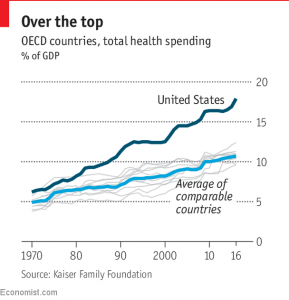
This graph shows that the US spends a significant more amount than other countries do on healthcare. Thua prompts the question, is it still worth it to have universal healthcare if the US is already paying a high amount without it?
To start off, “Universal health care is about more than our health- it is also a prescription for economic transformation, budget, and tax reform, and public sector strengthening” (Rudiger, 2016). In order words, like any country, the US is all about money. Thus, justifying those who argue that implanting universal healthcare will hurt the economy.
The calculation of implementing universal healthcare converge in the US would be an additional $19 trillion of federal debt. In other words, the percentage of debt would increase from 74 (from 2015) to 154 percent of GDP by 2026” (“Pros & Cons – ProCon.org”).
The Negative Impacts of Universal Healthcare
- Raise taxes. One of the main reasons European countries can implement a universal healthcare system is through higher taxes, with payroll taxes averages 37% higher than an average paid US worker with 15.3% (Gregory, 2013). For this reason, people who are against higher taxes will not be in favor and are especially paying for other people’s healthcare.
- Increase US debt. As many already know, the US consists of health insurance such as Medicare (those 65+ years of age or have a qualifying disability, Medicaid (those with low incomes), etc. Overall, they are government programs that former US House Budget Committee Chairman Paul says is already at such a high amount, and having universal healthcare will only further that amount of debt (Korobkin, 2014).
